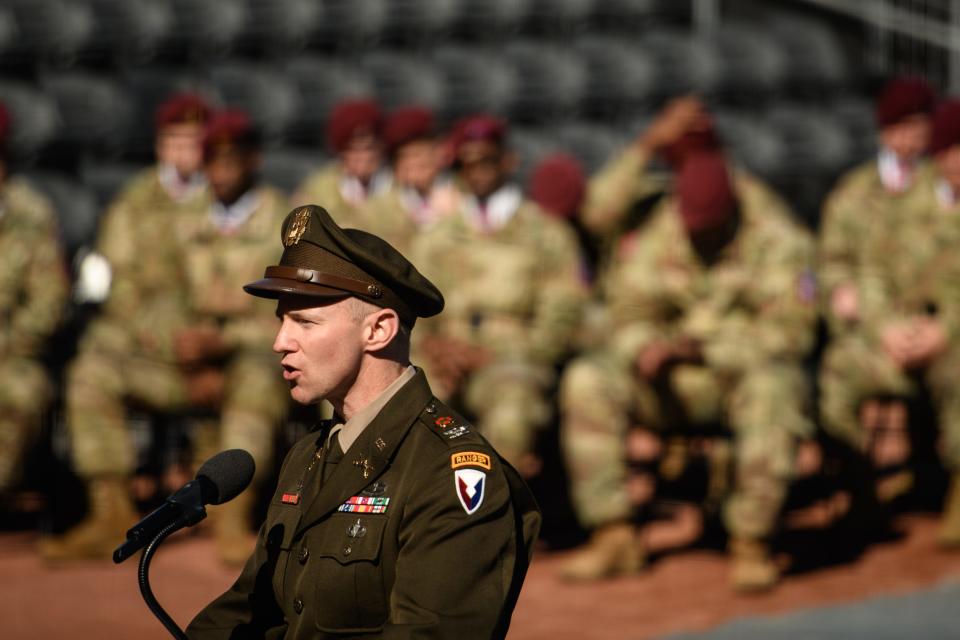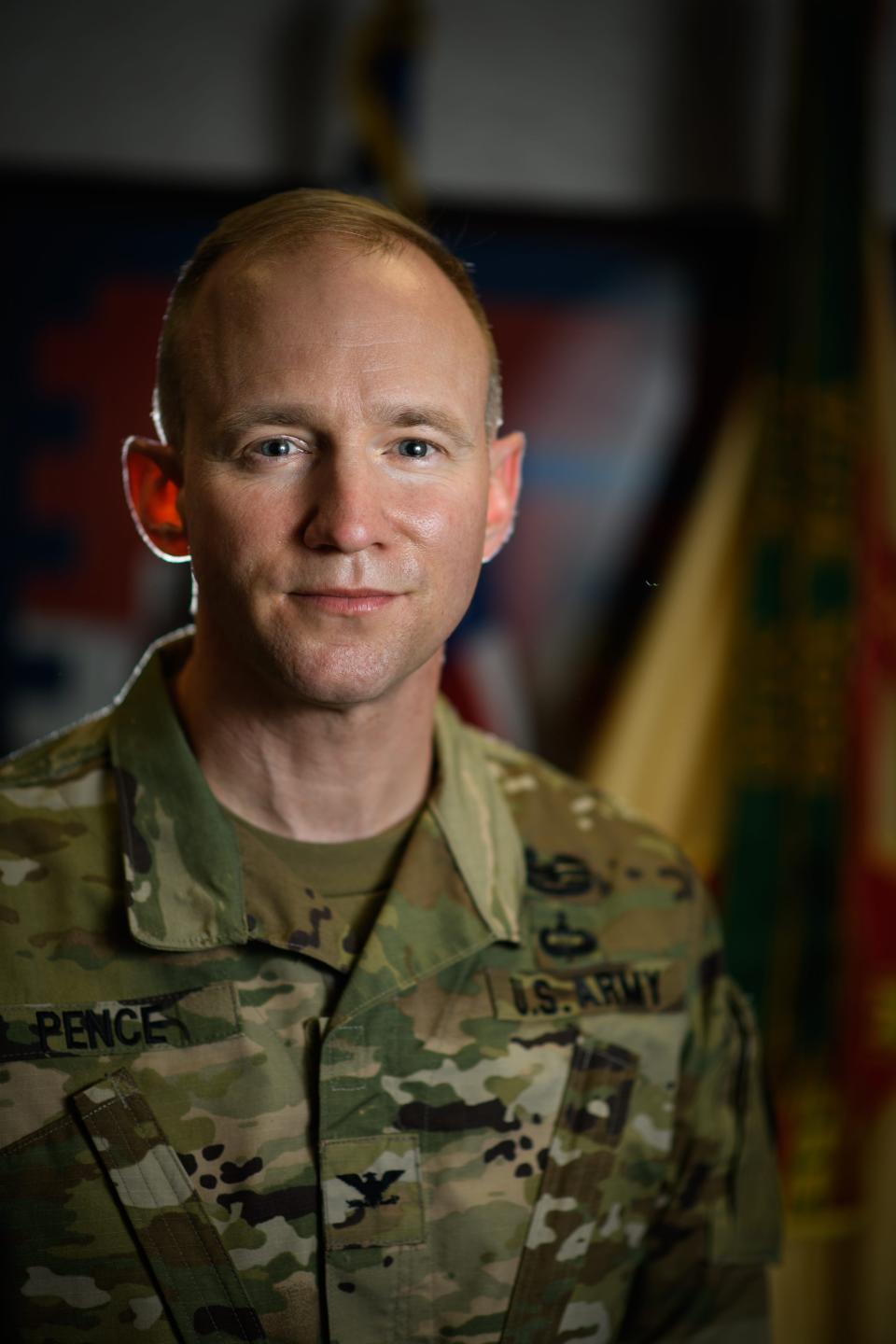I oversaw the change to Fort Liberty from Fort Bragg. Here is why there is no better name.
- Oops!Something went wrong.Please try again later.
Recent articles show a need for more understanding of the history and context behind renaming Fort Bragg to Fort Liberty. As the former garrison commander who convened the sessions culminating in the new name, I can provide accurate context.
I will describe the stages of grief as they relate to the name change, give a firsthand account of the process that led to the renaming and show that there is no better name for the “Center of the Universe.” We can enthusiastically support Fort Liberty while extending empathy to those who have not yet come to terms with change.

I should note that I am an active-duty colonel serving at The Pentagon, and my editorial comments are my own; they do not represent the position of the U.S. Army and the Fort Liberty Garrison Command.
A form of grief
Many people have a nostalgic and reverent attachment to the words Fort Bragg. While the base's namesake, Confederate General Braxton Bragg, was less than inspiring, the word, Bragg, came to be synonymous with the spirit of the Special Forces and airborne communities. For this reason, when the name changed, many of us experienced the stages of grief as if a loved one died.
The five stages of grief are denial, anger, bargaining, depression and acceptance. People cycle through them at their own pace, and regressing is normal. The first stage, denial, was evident in 2021 when people thought it would never happen. The former president even vetoed the bill that mandated change, only to have his veto overturned by a broad bipartisan consensus.
More: ‘Fort Ridgway’ memories: In Fayetteville, I found a great community
More: Fort Bragg officially becomes Fort Liberty as post breaks ties with Confederacy
I witnessed the next phase, anger, when a talented civilian angrily slammed his fists on a table at the thought of a name change. During the bargaining phase, many people rationalized that if it had to change, it should be this person who looks like me, has my background, etc.
Depression is the next stage. While no one mourns for an installation as they do for a loved one, people felt sadness when they realized that “Fort Bragg,” the namesake of many memories, will not live on into the future. The final phase, acceptance, is where so many actively serving in the Army and living in the community are now.

My own first pick: Gen. Gavin
I started my process as a proponent for Gen. “Jumping” Jim Gavin, a World War II airborne icon, as the namesake for the post. As I better understood the installation, however, I realized there are about 20,000 82nd Airborne paratroopers and another 18,000 Special Forces professionals assigned to Fort Liberty.
Gavin never served with the Special Forces, so naming the post after him would alienate nearly 50% of the installation. Another heroic name under consideration was Medal of Honor recipient Master Sgt. Roy P. Benavidez. His inspiring life story was a top choice. But what about the other heroic trailblazers with a history at Fort Bragg?
I met the other eight garrison commanders with posts named after Confederate generals and realized that no other place has the breadth of talent that Fort Liberty has in its history. That brings us to the process.
A broad cross-section of opinions
I was honored to convene meetings with a diverse senior panel of leaders from the military and community. Following months of COVID-19 protocols, community relations had atrophied. Using tools I learned while pursuing a Master's in Business Administration, I performed a stakeholder analysis and identified critical leaders. Using patterns of thought I learned from the U.S. Army School for Advanced Military Sciences, I sought to understand the problem before I visualized and described the problem to others.
A decision was not mine to make; the Congressional Naming Commission handled that. My role was to bring together the community and installation leadership and ensure the Naming Commission heard their views.
If the renaming of Fort Bragg were ever to have a chance of succeeding, the name would need to be discussed and debated with a broad cross-section of community leaders. Retired Gen. Dan McNeill and retired Sgt. Major Steven England were clear personal leaders from the veteran community. The mayor of Fayetteville, the chairman of the Cumberland County Board of Commissioners, and the chairman of the Lumbee Tribe were crucial positional leaders.
Business leaders and cultural leaders from the Fayetteville pastoral community would play a vital role. Once assembled, we met as a whole body several times and spent countless hours on the phone and in virtual meetings. We did not labor for personal gain, but all sought to identify the best possible way forward for the entire community.
Liberty ties it all together
Our outreach activities in 2022 were high-paced and proactive. We held Facebook Live town halls with live questions in Fayetteville, Fayetteville State University and Cumberland County. A user-friendly survey collected thousands of responses. The volume of worthy names was astounding.
There are over 30 Medal of Honor recipients, 300 4-star generals, and countless trailblazing inspirational stories from patriots with connections to Fort Liberty. It became clear that there were many well-deserving namesakes for the installation.
Under this context, Gold Star mother Patti Elliott, whose son tragically lost his life in Iraq, suggested a value instead of a name. She said that choosing any name would detract from those unique heroes who were not selected.
The panel considered the names from the Army Values. Retired Gen. Dan K. McNeill suggested “Liberty” because the word appears both in the Special Forces motto, "de Oppresso Liber," and the first line of the All-American song “We’re All-American and proud to be … for we are the soldiers of Liberty.”
Liberty has a connection to the 18th Airborne Corps headquarters and all of the separate brigades with the Liberty Markers they left along liberated towns and villages in WWII. Official replicas reside at the 82nd Airborne Division and 18th Airborne Corps Headquarters.
Liberty is tied to the community in the Liberty Point Resolves. In 1775, before the Declaration of Independence, 55 North Carolina patriots met at a spot that would later be named Fayetteville and pledged their livelihoods to gain independence from Great Britain. No other word is so explicitly tied to the Special Forces, the 82nd Airborne, and the community.
Not a plain name
To the uninformed, the most significant disadvantage to Fort Liberty’s name is that it appears plain. On the contrary, I served at Forward Operating Base Airborne in Afghanistan and never wondered whether the base missed an opportunity to commemorate a human.
In the case of Fort Bragg, however, the diverse panel was considering a bold recommendation utterly different from all eight other posts under review. Going so far ahead risked a backlash from all those with a preferred human name for the namesake. Despite the fears that outsiders would disparage the name, they realized they had an enormous opportunity to name the post for the ideal on which this great nation was founded, liberty, and to do so without alienating one entire group or another.
Not all forts need to be named Liberty; only one that is the tip of the spear for the nation, the post earning the title of “nation’s 911.” Due to the explicit connection to the Special Forces, 82nd Airborne, and the Fayetteville community, no place is more deserving of the namesake of liberty.
While there are five stages of grief for a loved one, there is a sixth step of change: growth. Every member of that diverse panel came together to support Fort Liberty as the recommendation. The Congressional Naming Commission highlighted the enthusiastic community support in its report. Active-duty leaders in the airborne and Special Forces community joined the veterans and elected leadership to enthusiastically support the name.
Regardless of anything else in their lives or their units, soldiers serving at Fort Liberty know their installation’s name is tied to the bedrock ideal of their beloved nation. As a squadron commander in the 82nd Airborne Division, I never referenced Braxton Bragg to enhance the morale of my cavalry scouts. They would have laughed me off the base.
And who are we fooling when we think historic names have some magical effect on people? If soldiers want to emulate Gen. Matthew Ridgway, what behaviors would change? Do they start smoking pipes? No. Motivation starts intrinsically with the “why:” Why do we serve? Why do we risk our lives? Nothing embodies the answer more than the motivation of America’s founding fathers: Liberty.
I am forever proud of my contribution to renaming Fort Bragg to Fort Liberty, but I do not let that pride turn to anger toward those who feel differently. We have not heard the last of the detractors and the second-guessers.
Many have never served on the installation or served very briefly, and few are jumpmasters or special forces qualified. For them, I extend empathy and sympathy, for underneath their angry words, they are struggling with the stages of grief on their timeline.
When people understand the background and history of the change, they accept it. And in my experience, those who know the history and care about the installation are the true soldiers of Liberty.
Col. Scott Pence works at the Pentagon on the Joint Staff as the orders book briefer to the Secretary of Defense. He was the garrison commander from 2020-2022 during which time Fort Bragg was renamed Fort Liberty.
This article originally appeared on The Fayetteville Observer: Fort Bragg to Fort Liberty: I oversaw the change. The community chose best

